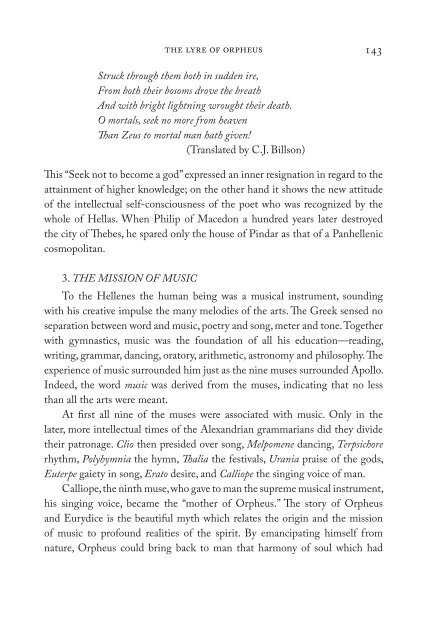The Gospel of Hellas - Research Institute for Waldorf Education
The Gospel of Hellas - Research Institute for Waldorf Education
The Gospel of Hellas - Research Institute for Waldorf Education
You also want an ePaper? Increase the reach of your titles
YUMPU automatically turns print PDFs into web optimized ePapers that Google loves.
the lyre <strong>of</strong> orpheus<br />
Struck through them both in sudden ire,<br />
From both their bosoms drove the breath<br />
And with bright lightning wrought their death.<br />
O mortals, seek no more from heaven<br />
Than Zeus to mortal man hath given!<br />
(Translated by C.J. Billson)<br />
This “Seek not to become a god” expressed an inner resignation in regard to the<br />
attainment <strong>of</strong> higher knowledge; on the other hand it shows the new attitude<br />
<strong>of</strong> the intellectual self-consciousness <strong>of</strong> the poet who was recognized by the<br />
whole <strong>of</strong> <strong>Hellas</strong>. When Philip <strong>of</strong> Macedon a hundred years later destroyed<br />
the city <strong>of</strong> <strong>The</strong>bes, he spared only the house <strong>of</strong> Pindar as that <strong>of</strong> a Panhellenic<br />
cosmopolitan.<br />
3. THE MISSION OF MUSIC<br />
To the Hellenes the human being was a musical instrument, sounding<br />
with his creative impulse the many melodies <strong>of</strong> the arts. <strong>The</strong> Greek sensed no<br />
separation between word and music, poetry and song, meter and tone. Together<br />
with gymnastics, music was the foundation <strong>of</strong> all his education—reading,<br />
writing, grammar, dancing, oratory, arithmetic, astronomy and philosophy. <strong>The</strong><br />
experience <strong>of</strong> music surrounded him just as the nine muses surrounded Apollo.<br />
Indeed, the word music was derived from the muses, indicating that no less<br />
than all the arts were meant.<br />
At first all nine <strong>of</strong> the muses were associated with music. Only in the<br />
later, more intellectual times <strong>of</strong> the Alexandrian grammarians did they divide<br />
their patronage. Clio then presided over song, Melpomene dancing, Terpsichore<br />
rhythm, Polyhymnia the hymn, Thalia the festivals, Urania praise <strong>of</strong> the gods,<br />
Euterpe gaiety in song, Erato desire, and Calliope the singing voice <strong>of</strong> man.<br />
Calliope, the ninth muse, who gave to man the supreme musical instrument,<br />
his singing voice, became the “mother <strong>of</strong> Orpheus.” <strong>The</strong> story <strong>of</strong> Orpheus<br />
and Eurydice is the beautiful myth which relates the origin and the mission<br />
<strong>of</strong> music to pr<strong>of</strong>ound realities <strong>of</strong> the spirit. By emancipating himself from<br />
nature, Orpheus could bring back to man that harmony <strong>of</strong> soul which had

















